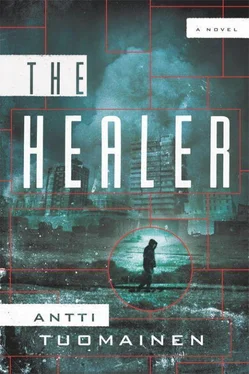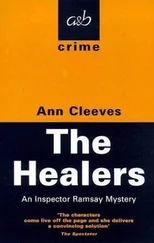“My daughter’s in Norway,” Jaatinen said, taking me by surprise. “She’s been there four years now, ever since Irina, her mother—my wife—died. A drug runner ran her down with his SUV as she was riding her bike to work.”
I glanced at him. He was still watching the old couple.
“The driver got a year and a half probation. I got single parenthood. Which didn’t go well, of course, since I’m always at work. I have to be at work—school and day care cost so much. When my daughter’s godparents suggested that she come stay with them in Norway, I said yes. I don’t know if that was the right thing to do. And I don’t know what else I could do. As long as I keep earning, we can afford for her to live there.”
Hotels loomed on the right, the flags in their courtyards fluttering in the morning wind. They were full. Who would have guessed that Finland would benefit from people losing their homes in the south?
I didn’t know what to say to Jaatinen. It didn’t matter, since he continued his story without waiting for me to comment.
“To send her to Norway, I had to sell my little house in Korso. I was lucky I managed to sell it at all. Several young families bought it, some kind of shared living arrangement, for safety. They bought it for half of what I paid for it, but for some reason the debt I had left didn’t trouble me.”
“Where do you live now?” I asked, for something to say.
“In Pasila.”
“You must have a short commute to work, then.”
“From the basement to the fourth floor.”
He smiled again, but his eyes weren’t along for the smile.
We passed Parliament House, which was surrounded by security barriers with twenty-four-hour floodlights on top. Their light looked feverish in the metallic gray of the morning.
“I meant what I said before,” Jaatinen said.
“What was that?” I asked.
“That I keep trying because I’m a cop. I’m not one of these unemployed cops working as a security guard, playing soldier. That’s why I didn’t answer right away when you asked about those guards with the “A” logo at the Sports Hall. It’s a new security company, as you probably guessed. The fastest growing one. Aggressive. Feared, in fact.”
He switched on his turn signal and changed lanes.
“These security companies are all the same, if you ask me. Most of the guards aren’t cut out for protecting the public and keeping order. More cut out for something entirely the opposite, in fact. We know of one security company that actually robs people and businesses instead of protecting them.”
Jaatinen dropped me off at the corner by the Forum. I got out of the car, and he eased back into traffic—with his signal on, of course. I dug my phone out of my pocket, looked at the photos I’d taken, clipped an image of the “A” logo and did an image search on it.
The company was called A-Secure. There was no specific information on it, no street address. The phone numbers online didn’t return any names when I searched for them. I looked at the logo again but still didn’t know what it was I expected it to tell me.
I crossed the street and headed toward Urho Kekkosen katu, for something to do.
“Do you think we’ll ever move again?” Johanna asked one night two or three weeks ago just as she was about to fall asleep.
I put down the book I was reading. Johanna pressed against me, the blanket rustling, and laid her head partly on the pillow, partly against my neck. The soft light of the reading lamp shone on the golden yellow of her skin. At a glance, her delicate arm lying across my stomach on the black-and-white blanket resembled a doll’s.
“Why do you ask that?”
“I was just thinking,” she said, and I could almost feel her lips against my neck as she spoke.
“Would you like to move?” I asked.
“I guess not.”
“What about just for pretend?”
“Maybe just for pretend.”
“Where would you move to, just for pretend?”
“That’s the thing,” she said, raising her head from the pillow and wrapping herself halfway around me. “There’s no place I’d like to move to, except for pretend.”
She braced herself on an elbow.
“I’ve been going around Helsinki the past few days working on this story. I went to a lot of places I haven’t seen for a long time, and I kept getting a really sad, wistful feeling.”
“A lot of places have changed quite a bit the past few years. Even right around here.”
“I guess so,” she said. “But when you see places where you used to live and you remember what they used to be like and all the things you did there and all the people you knew… friends, family, people like that.”
Thinking about this conversation later, I knew, of course, that I should have asked her where she had gone, why she went there, what she found there. But it was an ordinary evening and we were just lying in bed talking like we always did, like we always would.
“It also made me wonder,” she said, “whether people could have done something else, something more. Done things differently. But at the same time I know that they couldn’t.”
Everything she said that night had an insidious underlying meaning now: Pasi Tarkiainen. He was the snake that slipped into my thoughts through the smallest opening and poisoned all my memories. I shook him forcefully from my mind and saw Johanna before me again.
She raised her head and looked into my eyes from so close that it was difficult to clearly see the flecks of color in her irises, her hard, black pupils, or the expression behind their moist surface.
“On the one hand, we’ve got so much,” she said. “But at the same time, so much is already lost.”
I took her hand. She answered with a gentle squeeze.
“If I understand you correctly, we’re not moving.”
A dark shadow crossed her gaze quick as lightning, then vanished. She smiled.
“Let’s not,” she said quietly.
She heaved herself up, putting her hand on the pillow beside my ear and bending over to kiss me with warm, soft lips.
“Let’s not,” she said again.
* * *
A PIT HAD APPEARED at the intersection of Urho Kekkosen katu and Fredrikinkatu. Some men were crowded around it, and an excavator stood with its shovel raised on one side of it. Trucks from the electricity and water departments were lined up in front of the pit facing Fredrikinkatu as if waiting to drive into it. Traffic was driving up over the curb to get around it.
I stood on the corner, pulled my scarf tighter around my neck, zipped my parka all the way up, readjusted my stocking cap, and carefully pushed the cuffs of my gloves into the ends of my sleeves. When one of the workers from the water department, a red-faced man in winter coveralls, walked by me, I asked him what had happened. As you can see, he said, there’s been a cave-in. I couldn’t get any more information out of him, but then there was no reason I should.
I walked around the intersection and looked first at Temppeliaukio Church, then at Malminkatu, Fredrikinkatu, Urho Kekkosen katu, and then at the church again. Now and then I looked at the pit in the middle of the intersection. Since there was nothing in any direction to see but the pit, and since the wind seemed to be growing teeth, I gave up and headed toward Töölö, to Ahti and Elina’s house.
When is it time to admit that you don’t know someone as well as you thought you did a moment before?
I tried to gather the facts in my mind as neutrally as I could, to filter truth from imagination. I tried to separate my worst fears from what I could see with my own eyes to be true. It wasn’t easy, but it was for the woman I love. No matter how I tried, I couldn’t remember Johanna ever mentioning anything about Tarkiainen or ever saying a word about the house in Kivinokka. But then I couldn’t think of a reason why she would, either. She had no reason to. Who could have predicted that Tarkiainen’s and Johanna’s paths would cross again?
Читать дальше












